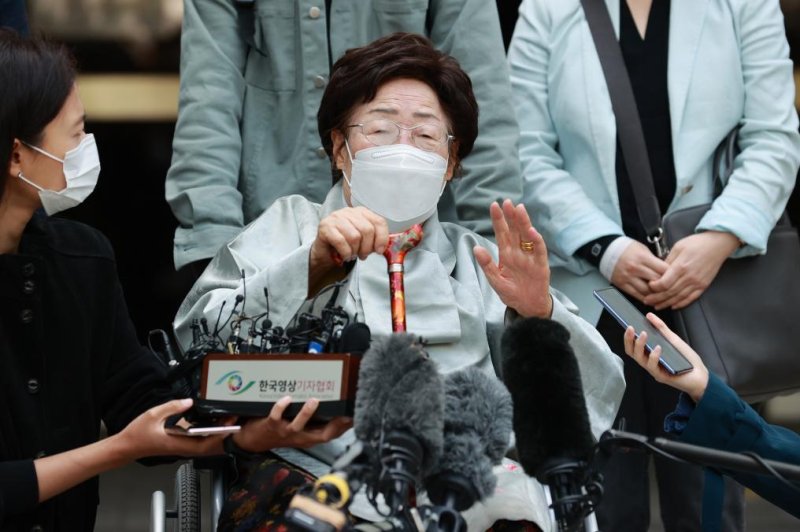1 of 2 | Lee Yong-soo, one of the plaintiffs in a case against Japan over wartime sexual slavery, speaks to reporters outside Seoul Central District Court on Wednesday after the court dismissed her case. Photo by Yonhap
SEOUL, April 21 (UPI) -- A South Korean court on Wednesday ruled against a group of so-called comfort women seeking damages against Japan for wartime sex slavery, citing Tokyo's claim of state immunity against being sued in a foreign court without its consent.
The lawsuit was originally filed in 2016 by 20 plaintiffs, including 11 surviving comfort women. Japan had boycotted the proceedings at the Seoul Central District Court.
The decision comes after a different chamber of the same court ruled in favor of 12 plaintiffs in January. That landmark verdict found Japan must pay damages of $91,900 to each of the five surviving plaintiffs and the family members of those who had died.
Human rights groups and advocates for the comfort women spoke out against Wednesday's decision.
Amnesty International's East Asia researcher Arnold Fang called the ruling "a major disappointment that fails to deliver justice" to survivors and their families.
"This ruling runs contrary to a decision by the same court in January, which required Japan to accept legal responsibility for its systematic sexual enslavement that amounted to crimes against humanity and war crimes," he said in a statement. "What was a landmark victory for the survivors after an overly long wait is again now being called into question."
A statement co-signed by several South Korean activist groups said the court "ignored the voices of victims who have fought to reveal the crimes of Japanese military sexual slavery and to restore their dignity."
The ruling is subject to an appeal, and the activists said they would "continue our legal struggles to demand the South Korean Court to rule on truth and justice."
"The Japanese government should acknowledge its responsibility for the Japanese military sexual slavery, make an official apology and legal reparations for the victims and take action for proper history education," the statement said.
Japan occupied Korea from 1910 to 1945, a period of colonization that ended after World War II. Some historians estimate that up to 200,000 girls and women, mainly Koreans, were used as sex slaves by Japan in military brothels.
The issue of comfort women -- the euphemism used to describe the sex slaves -- has long been a contentious issue in the relationship between South Korea and Japan.
Tokyo contends that all wartime reparations claims were settled by a 1965 bilateral treaty that normalized relations between the two countries.
A further 2015 agreement between then-Japanese Prime Minister Shinzo Abe and since-impeached South Korean President Park Geun-hye contributed some $8 million to set up a foundation to support the comfort women.
However, in 2017, South Korean President Moon Jae-in declared that the negotiations had serious flaws and said the agreement "does not resolve the issue over comfort women."
The relationship between Seoul and Tokyo has been at a low ebb since South Korea's Supreme Court ruled in 2018 that two Japanese companies must pay compensation to wartime victims of forced labor. The decision sparked a trade war and led to a widespread boycott of Japanese products in South Korea.
More recently, South Korea has raised concerns about Japan's decision to release contaminated wastewater from its destroyed Fukushima nuclear plant into the sea.
One of the plaintiffs in the comfort women case, 92-year-old Lee Yong-soo, has called on the South Korean government to bring the case to the United Nations' international tribunal for resolution.
The survivor of wartime sex slavery repeated her request after the verdict on Wednesday, saying Seoul should "take the issue to the International Court of Justice regardless of whether it produces a good or bad outcome," news agency Yonhap reported.















